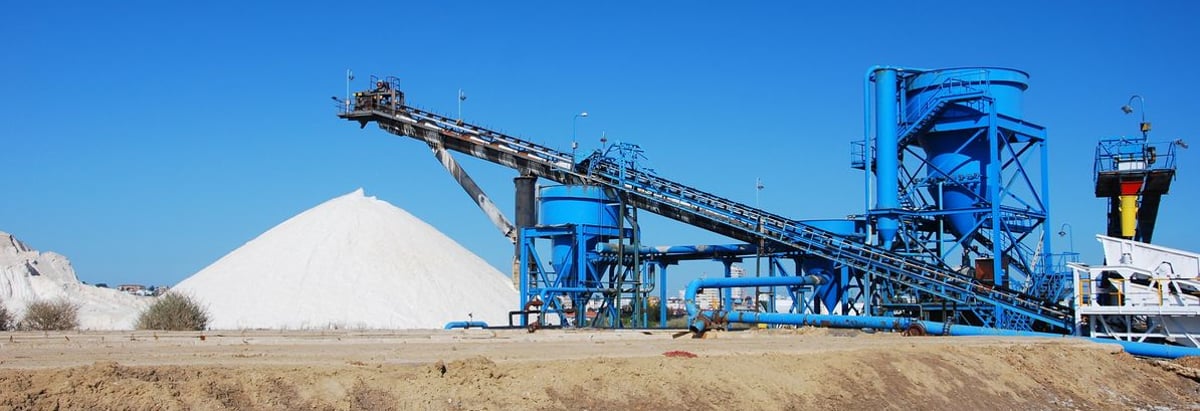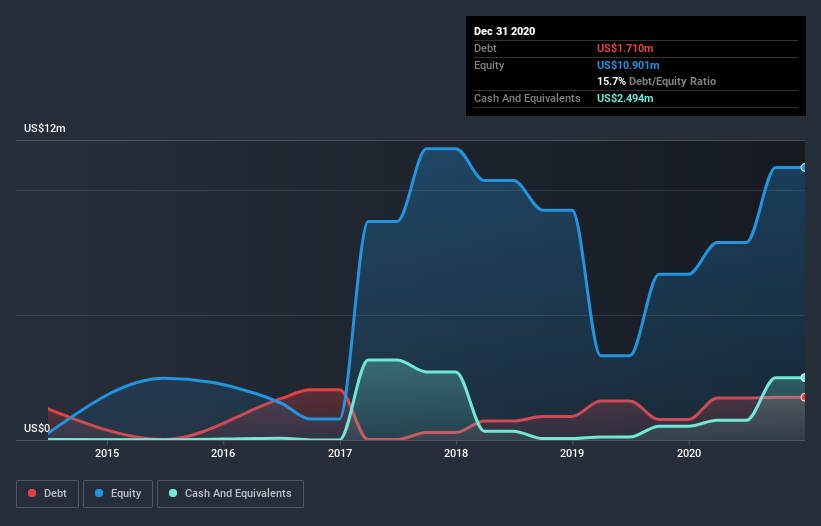
Warren Buffett famously said, 'Volatility is far from synonymous with risk.' It's only natural to consider a company's balance sheet when you examine how risky it is, since debt is often involved when a business collapses. Importantly, Rainbow Rare Earths Limited (LON:RBW) does carry debt. But the real question is whether this debt is making the company risky.
What Risk Does Debt Bring?
Generally speaking, debt only becomes a real problem when a company can't easily pay it off, either by raising capital or with its own cash flow. Part and parcel of capitalism is the process of 'creative destruction' where failed businesses are mercilessly liquidated by their bankers. However, a more frequent (but still costly) occurrence is where a company must issue shares at bargain-basement prices, permanently diluting shareholders, just to shore up its balance sheet. Of course, debt can be an important tool in businesses, particularly capital heavy businesses. The first thing to do when considering how much debt a business uses is to look at its cash and debt together.
View our latest analysis for Rainbow Rare Earths
How Much Debt Does Rainbow Rare Earths Carry?
As you can see below, at the end of December 2020, Rainbow Rare Earths had US$1.71m of debt, up from US$817.0k a year ago. Click the image for more detail. But it also has US$2.49m in cash to offset that, meaning it has US$784.0k net cash.

How Healthy Is Rainbow Rare Earths' Balance Sheet?
We can see from the most recent balance sheet that Rainbow Rare Earths had liabilities of US$1.73m falling due within a year, and liabilities of US$808.0k due beyond that. On the other hand, it had cash of US$2.49m and US$630.0k worth of receivables due within a year. So it actually has US$591.0k more liquid assets than total liabilities.
Having regard to Rainbow Rare Earths' size, it seems that its liquid assets are well balanced with its total liabilities. So while it's hard to imagine that the US$111.3m company is struggling for cash, we still think it's worth monitoring its balance sheet. Simply put, the fact that Rainbow Rare Earths has more cash than debt is arguably a good indication that it can manage its debt safely. The balance sheet is clearly the area to focus on when you are analysing debt. But you can't view debt in total isolation; since Rainbow Rare Earths will need earnings to service that debt. So if you're keen to discover more about its earnings, it might be worth checking out this graph of its long term earnings trend.
Over 12 months, Rainbow Rare Earths reported revenue of US$793k, which is a gain of 70%, although it did not report any earnings before interest and tax. Shareholders probably have their fingers crossed that it can grow its way to profits.
So How Risky Is Rainbow Rare Earths?
Statistically speaking companies that lose money are riskier than those that make money. And in the last year Rainbow Rare Earths had an earnings before interest and tax (EBIT) loss, truth be told. And over the same period it saw negative free cash outflow of US$3.5m and booked a US$2.0m accounting loss. With only US$784.0k on the balance sheet, it would appear that its going to need to raise capital again soon. With very solid revenue growth in the last year, Rainbow Rare Earths may be on a path to profitability. Pre-profit companies are often risky, but they can also offer great rewards. There's no doubt that we learn most about debt from the balance sheet. But ultimately, every company can contain risks that exist outside of the balance sheet. For example, we've discovered 5 warning signs for Rainbow Rare Earths (3 can't be ignored!) that you should be aware of before investing here.
When all is said and done, sometimes its easier to focus on companies that don't even need debt. Readers can access a list of growth stocks with zero net debt 100% free, right now.
If you decide to trade Rainbow Rare Earths, use the lowest-cost* platform that is rated #1 Overall by Barron’s, Interactive Brokers. Trade stocks, options, futures, forex, bonds and funds on 135 markets, all from a single integrated account. Promoted
New: AI Stock Screener & Alerts
Our new AI Stock Screener scans the market every day to uncover opportunities.
• Dividend Powerhouses (3%+ Yield)
• Undervalued Small Caps with Insider Buying
• High growth Tech and AI Companies
Or build your own from over 50 metrics.
This article by Simply Wall St is general in nature. It does not constitute a recommendation to buy or sell any stock, and does not take account of your objectives, or your financial situation. We aim to bring you long-term focused analysis driven by fundamental data. Note that our analysis may not factor in the latest price-sensitive company announcements or qualitative material. Simply Wall St has no position in any stocks mentioned.
*Interactive Brokers Rated Lowest Cost Broker by StockBrokers.com Annual Online Review 2020
Have feedback on this article? Concerned about the content? Get in touch with us directly. Alternatively, email editorial-team (at) simplywallst.com.
About LSE:RBW
Rainbow Rare Earths
Engages in the development of rare earth minerals projects in Guernsey.
Medium-low with mediocre balance sheet.
Market Insights
Community Narratives



